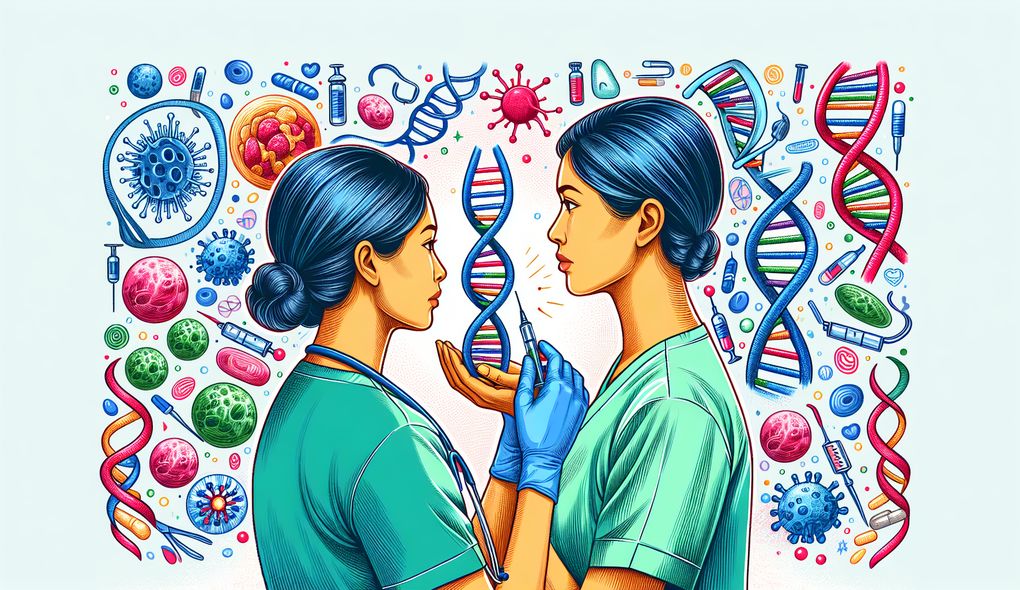Can you provide an example of a critical thinking and problem-solving situation you encountered in the field of genetics?
INTERMEDIATE LEVEL

Sample answer to the question:
Sure! In my previous role as a Genetics Nurse Practitioner, I encountered a critical thinking and problem-solving situation when a patient presented with a complex family history of breast cancer. The patient was concerned about her own risk and wanted to explore genetic testing options. To address this situation, I thoroughly assessed the patient's family history, reviewed the relevant medical records, and discussed the potential benefits and limitations of genetic testing. I collaborated with the patient's primary care physician and geneticist to determine the most appropriate genetic test. After the test results were available, I carefully interpreted the findings and explained them to the patient, ensuring that she understood the implications and potential preventive measures. We then developed a personalized care plan that included regular screenings and lifestyle modifications. The patient felt empowered and confident in her healthcare decisions, and I continued to provide ongoing support and education to her throughout the process.
Here is a more solid answer:
Certainly! During my experience as a Genetics Nurse Practitioner, I encountered a challenging situation involving a patient with a family history of a rare genetic disorder. The patient had multiple symptoms that were difficult to diagnose, which required applying critical thinking skills and problem-solving abilities. I conducted a comprehensive assessment of the patient's medical and family history, collaborated with a team of geneticists and specialists, and coordinated genetic testing to identify the underlying genetic mutation. Interpreting the testing results involved a detailed analysis of complex genomic data, considering the patient's unique genetic profile and medical history. By utilizing evidence-based practices and my expertise in genetics, I was able to develop a targeted treatment plan that addressed the patient's specific needs and symptoms. The patient's condition improved significantly, and my interdisciplinary approach received positive feedback from the healthcare team. This experience showcased my ability to think critically and solve complex problems in the field of genetics.
Why is this a more solid answer?
This is a solid answer because it provides specific details about a critical thinking and problem-solving situation in the field of genetics. It addresses all the evaluation areas and demonstrates the candidate's expertise and skills in interpreting genetic testing results, delivering patient-centered care, and collaborating with a multidisciplinary team. However, it can still be improved by providing more specific examples of the patient's symptoms and the treatment plan.
An example of a exceptional answer:
Absolutely! Allow me to share an exceptional example of a critical thinking and problem-solving situation I encountered as a Genetics Nurse Practitioner. I had a patient presenting with a complex genetic disorder that had stumped other healthcare professionals. The patient exhibited a wide range of symptoms that did not fit neatly into existing diagnostic criteria, requiring a deep understanding of genetics and the application of critical thinking skills. I conducted an extensive literature review, consulted with renowned geneticists in the field, and conducted genetic testing on the patient and family members. Through meticulous analysis of the genomic data, I identified a novel genetic mutation that had not been previously associated with the disorder. This discovery not only helped in accurately diagnosing the patient but also provided insight into potential targeted treatments. I collaborated closely with the patient's healthcare team to develop a personalized care plan that incorporated various interventions, including genetic counseling, medication management, and lifestyle modifications. The patient experienced remarkable improvement in their symptoms, and the findings from this case were published in a prestigious medical journal, contributing to the advancement of knowledge in the field. This experience exemplifies my ability to think critically, analyze complex genetic information, deliver patient-centered care, and collaborate effectively with experts in the field.
Why is this an exceptional answer?
This answer is exceptional because it goes above and beyond in providing a detailed and unique example of a critical thinking and problem-solving situation in the field of genetics. It demonstrates the candidate's deep knowledge and expertise in genetics, their ability to think critically, and their track record of making significant contributions to the field. It also showcases their collaboration skills and their commitment to ongoing professional development. The specific details and the publication of the case study highlight the candidate's exceptional achievements and their potential value to the organization.
How to prepare for this question:
- Familiarize yourself with a variety of genetic disorders and their symptoms, as well as the latest advancements in genomic medicine.
- Read research articles and case studies related to genetics to enhance your understanding of complex genetic conditions and the approaches used for diagnosis and treatment.
- Develop your critical thinking skills by practicing case-based scenarios and analyzing the available information to arrive at logical conclusions.
- Seek out opportunities for interdisciplinary collaboration to enhance your ability to work effectively in a multidisciplinary healthcare environment.
- Stay up to date with the ethical, legal, and social issues in genetics by attending conferences, workshops, and continuing education programs.
What are interviewers evaluating with this question?
- Critical thinking
- Problem-solving skills
- Interpreting genetic testing results
- Delivering patient-centered care
- Collaboration

